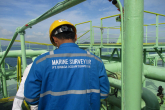Naval Combat Officer and other Naval Careers
Key tasks:
The key tasks of a Naval Combat Officer encompass a wide range of responsibilities related to commanding naval vessels, leading combat operations, ensuring the safety and readiness of the crew, and contributing to strategic planning. Here are the key tasks associated with the role:
• Command of Naval Vessels
• Navigation and Seamanship
• Combat Operations
• Weapon Systems Management
• Crew Leadership
• Search and Rescue Operations
Entry requirements/training:
• Be a South African Citizen.
• Be between the age of 18 and 22 (graduates up to the age of 26).
• Have completed the National Senior Certificate (Grade 12).
• Preferably be single.
• Not be area bound.
• Have no record of a criminal record.
• Comply with the medical fitness requirements for appointment in the South African National Defence Force (SANDF).
• Combat Officers applicants must have Mathematics, Physical Science at level 4 and a Matric exemption.
Applicants up to the age of 26 who are in possession of an appropriate recognised University Degree or a 3-year Diploma or N4, N5 and N6 Certificate in Mechanical and Electrical Engineering are welcome to apply.
The opportunity to apply will be advertised in the national newspapers and once the application period is closed the paper selection will commence. Qualifying candidates are short listed to be invited for the MSD Selection. If selected you will then need to undergo psychometric testing, pre-employment medical assessment and interviews before final selection of candidates is made.
Combat Officers are one of the most highly qualified people in the military environment. Although this career is personally demanding, it is very stimulating, unique, and rewarding. The peak of a Combat Officer’s career is taking command of a warship. Other Navy careers include Weapons Operator, Protection Force, Engine room attendants, Submarine services, SA Navy Divers, Student Engineers, and Student Technical officers.
Associated job opportunities:
As the Military Skills Development programme is structured to supply trained personnel into the SA Navy, you are guaranteed of a job with the Navy should you meet all the training and physical requirements. However, the training also prepares you for jobs in civilian life. The SA Navy relies heavily on the expertise of all serving naval officers and ratings. Discipline, dedication, hard work, and a keen interest in the maritime environment will contribute to a successful career with infinite challenges and opportunities. The SA Navy has various specialisations and careers which are referred to as Musterings.
Course overview and subjects:
• Recruits are trained in various skills ranging from Seamanship, Environmental Awareness, Musketry, Computer Skills, Basic Financial Management Skills, Hygiene and Discipline to Work Ethics.
• All basic training in the South African Navy begins at SAS SALDANHA in Saldanha Bay, where Military Training for Ratings (MTR) takes place.
• Officer training is carried out at the SA Naval College in Gordon’s Bay, whilst specialist training is conducted at SAS SIMONSBERG in Simon’s Town.
• At SAS SALDANHA candidates are selected to go to the SA Naval College where they will undergo intensive officer training before filling posts in the Combat, Logistics, Personnel and Engineering branches of the SA Navy.
• Junior Ratings will receive specialised training for utilisation in musterings (functional areas) such as Combat Operators, Divers, Protection Force, Hospitality, Logistics, Radar Operators, Engine Room Attendants and Personnel Clerks.
• After a period of two years’ service, suitable MSD members will be recruited into the Core Service System.
• The remainder will be transferred to the Reserve Force for a period of five years where they will be used in posts to complement the Full Time Force.
• Those leaving the Navy on completion of MSD training will be equipped with skills that will make them competitive in the labour market.
• NQF Level and SAQA ID/Quality Assurance body.




